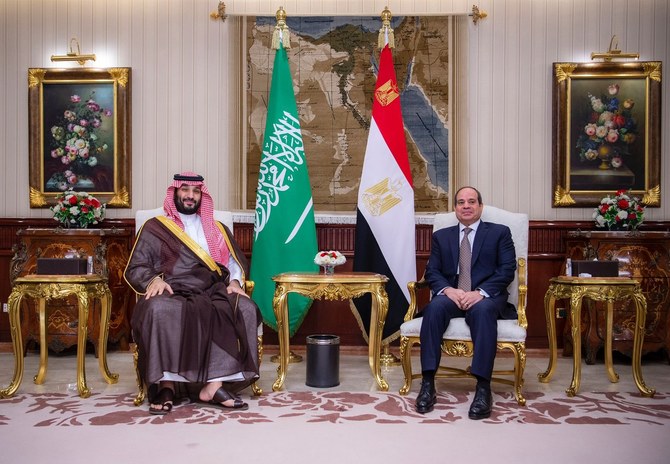
- ARAB NEWS
- 12 Jul 2025

Crown Prince Mohammed bin Salman arrived in Egypt on Monday. And US President Joe Biden is to visit Saudi Arabia next month, when he will meet many Arab leaders. So it seems that certain constants will be settled within the limits of inter-Arab relations on the one hand and Arab-global relations on the other.
In a month of diplomatic tours in the region, the crown prince’s visit to Cairo highlights the first constant, which is the strength and durability of Egyptian-Saudi relations. These have reached the level of a strategic partnership in light of the historically harmonious positions between the two countries and a common destiny that has brought them together. This relationship has increased in strength in recent years, with permanent contacts and successful visits between the leaders of the two countries, with the aim of strengthening and supporting relations in various fields.
These important developments in Egyptian-Saudi ties have taken place in parallel with a clear consensus on various regional and international issues. Egypt and Saudi Arabia bear the greatest burden in achieving Arab solidarity and reaching the goals that Arab people aspire to, from the Atlantic Ocean to the Arabian Gulf.
Meanwhile, Biden’s visit to Saudi Arabia is considered to be very important for both parties. The US is looking to settle differences and strengthen its partnership with Riyadh and with all Arabs in general, especially in light of the internal conditions it is witnessing ahead of November’s midterm elections. The current US administration is very concerned about the influences on its popularity and its waning opportunities to maintain a majority in Congress, so it is logical that Washington needs Arab support, especially with regard to oil prices.
Biden’s meeting with the crown prince will have great significance because it will emphasize that the two sides have settled the differences that recently arose as a result of their discordant visions on some issues. It will also emphasize the position of Saudi Arabia and its important role in America’s strategy in the region, as well as its role in the Arab and Islamic worlds.
This was evident in the statement of White House press secretary Karine Jean-Pierre, who pointed out that Biden “appreciates King Salman’s leadership and his invitation.” She added that: “He looks forward to this important visit to Saudi Arabia, which has been a strategic partner of the United States for nearly eight decades.”
The statement added that, during his visit, Biden will discuss a number of bilateral, regional and global issues, including the situation in Yemen and his support of the truce mediated by the UN, which has led to the most peaceful period since the war there began seven years ago. He will also discuss ways to expand economic and regional security cooperation, including the new and promising infrastructure and climate initiatives, as well as deterring threats from Iran and ensuring global energy and food security. Jean-Pierre added: “The president looks forward to outlining his affirmative vision for US engagement in the region over the coming months and years.”
The US is looking to settle differences and strengthen its partnership with Riyadh and with all Arabs in general
Dr. Abdellatif El-Menawy
There is no doubt that the Arab position toward the war in Ukraine is unique politically and economically. The Arab bloc did not rush behind the West in supporting Ukraine and also did not support the Russian position.
The Arabs, led by Egypt, Saudi Arabia and the UAE, are in a state of nonalignment with regard to the conflict, despite its clear repercussions on the export of grains and the high prices of commodities and products on the global market, which has undoubtedly exhausted the Arab peoples.
Therefore, the summit between the Gulf countries, Jordan, Egypt, Iraq and the US during Biden’s visit will undoubtedly address energy prices and establish a mechanism on how to provide food security in light of the repercussions of the Ukraine war and Iran’s threats.
Biden may well have known that the Arab position on this issue would not waver with time. During his visit, he might propose a multitude of incentives to change the situation in his favor, but confidence is great in the firmness of the Arab position, especially at this time, because it is based on rational thinking and an awareness of the global situation, as well as the internal conditions and the wealth that the Arabs possess, which can affect the whole world.
There could also be developments regarding the Palestinian cause. Jean-Pierre said that Biden will visit Israel, where he will discuss Tel Aviv’s security, prosperity and increasing integration in the region. And he will visit the West Bank “to consult with the Palestinian Authority and to reiterate his strong support for a two-state solution, with equal measures of security, freedom and opportunity for the Palestinian people.”
Although the White House press secretary’s statement appears diplomatic, it may actually carry clear hope of the establishment of security and peace in the Occupied Territories. There may be a shift in the American position on the situation in Palestine, after the crisis reached its climax during the previous US administration, which insisted on moving its embassy from Tel Aviv to Jerusalem to emphasize the right of Israel to the Islamic holy city. Arab countries opposed this move with great courage in international forums and institutions.
I am not exaggerating when stating that the Arab region is at a very sensitive point in its history. The American president — the most important head of state in the world — is, after a period of reflection and consultations, coming to the Arab land, acknowledging the size and weight of the countries of this region.